To read the original Tamil Article Click கல்வியழித்தல்
Dear Mr. Jeyamohan,
You have given a detailed response to Kumar Mullakkal’s question about reading/learning.
I am eager to know your take on the Manikka Vasagar quote:
I don’t need the learned;
Learning will happen hereafter…
Marabin Mainthan Muthiah
*
Dear J,
On the subject of Jeyakanthan, Sundara Ramasamy and reading/learning, you have the following to say.
“Ramakrishna Paramahamsa phrases it thus: we pry out the thorn in our foot with another thorn. We then throw both of them away as we move on. This principle also holds when prying out the thorn of ignorance with one of knowledge.”
Would I be right in saying that you speak of the idea of unlearning? I have my doubts about the feasibility of its practice.
Ram
Dear Ram & Muthiah,
It comes as no surprise that both your questions are practically the same. When I ask myself the same question, I can feel some clarity take shape. That is what is precious to me.
Not a single moment passes in our life when we aren’t constantly learning and unlearning. We are trained young by our culture, and by our circumstance. Even prior, our basic instincts will already have us well on our way. All that we learn is retained at the cost of clearing out what was already there. Every new thing learnt makes something we’ve learned before false. It settles down in the vacuum so created. Learning can only ever follow unlearning.
Narayana Guru says that when we learn, we discover that it’s all just ignorance. When our knowledge expands, it merely shines a brighter light at the breadth of our ignorance. New knowledge is possible only when we become aware of that vacuum. Our knowledge will be stunted if we are not prepared for that unlearning. That is the height of senselessness; the moment when the learned abandon wisdom.
This is what the master in the zen story says to the learned man who speaks of nothing but theories. The zen master’s analogy is the tea that overflows from a cup that is already full. The amount of learning is proportionate to the amount of unlearning. A friend once said, in computer science one cannot learn today unless they forsake that which was learned yesterday. This applies to everything.
Though this is happening naturally all the time, we’re profoundly aware of it when in the presence of great gurus. They teach us so many things, and by virtue of that, take just as many things away from us. It is a painful experience. While some gurus do it gently, some do it violently.
The biography of Milarepa, a Tibetan siddha, illustrates this. It is an important book on meditation. A book of poetry, too. The guru takes Milarepa, who was a seeker, through extreme physical and mental anguish. Overcoming those sorrows, Milarepa slowly begins unlearning, and becomes a student who is ready for learning. His poems reflect that dimension.
We can see this in Nitya’s life. Nataraja Guru deconstructs and recreates Nitya quite violently. He tears apart Nitya’s contemporary thoughts. He snatches and throws out the books, sends him out, mocks him to the point of tears. Many a time, Nitya takes umbrage and walks out. Nataraja Guru comes in search of him and brings him back.
But Nitya was a rather gentle person. He could not shout or ridicule. He spoke softly, like a flower in bloom. But when I met him in the 90’s, I underwent severe mental agony. At first, I used to be at loggerheads with him. I tried bullishly to retain all that I had already learned. Every time, I would leave greatly dejected.
Was everything that I had learnt false? Had my life thus far been a waste? I was confused. When that wave slowly subsided, I surrendered before him. I was sure that learning would happen. If we are not unlearning in the presence of a good book or a wise man, then we learn nothing. I have seen many who came to Sundara Ramasamy, and even Nitya, to only speak their mind, and promptly leave. It is especially true for fanatics of theory. They have nothing to learn. All they can think to do is tell the world what they know in an effort to change it.
I think Manikka Vasagar refers to these people who are rigid with religion, politics and philosophy. Similar lines can be found in the Thirumandiram and Siddhar poems. Jesus too says this. “If you don’t become a child, you won’t enter paradise.”
This unlearning can happen rather intensely. When Vivekananda went to meet Ramakrishna, he was full of revolutionary ideas of the Brahma Samaj. To him, Ramakrishna was just an ignorant worshipper of idols. On seeing Vivekananda, Ramakrishna was moved to tears. He hugged Vivekananda and asked “Why this delay? Do you know how long I have been waiting for you?” Confused, Vivekananda ran away.
When they met again, Ramakrishna made him meditate, and touched him gently. That touch made Vivekananda realise the baseless depth of meditative experience, and he broke down. He thought that he was going to die. But in that moment, all his knowledge ceased to exist. With an unburdened heart, he bared his soul before Ramakrishna.
Education is like stagnant water pooling through a crack among the rocks. Yogic wisdom is a tidal wave in which mere knowledge would drown completely. In the lives of wise men, we witness this great unlearning over and over again.
Jeyamohan

